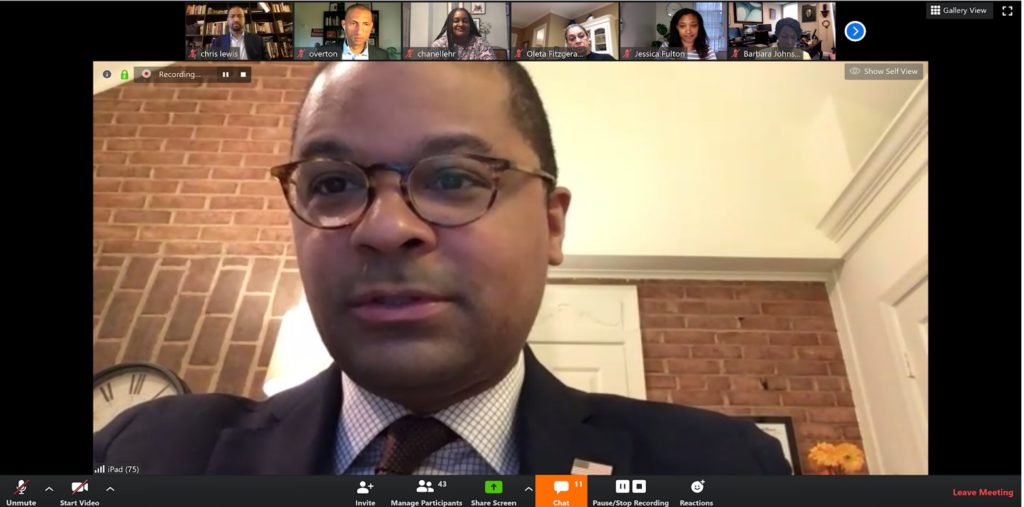Tech Policy

Joint Center Hosts Briefing with FCC Commissioner Geoffrey Starks on COVID-19 & the Digital Divide
On Tuesday, April 7, the Joint Center convened a panel of experts and key stakeholders for an online policy forum with FCC Commissioner Geoffrey Starks to discuss the concept of a “connectivity stimulus” to ensure that people in all communities in the United States are connected and have access to online education and economic opportunities during and following the COVID-19 crisis.
The expert respondents included Children’s Defense Fund Southern Regional Director Oleta Fitzgerald, NAACP LDF Director of Policy Lisa Cylar Barrett, Brookings Fellow Nicol Turner-Lee, Comcast Executive Director of Government and External Affairs Tony Williams, Google Director of Strategic Outreach and External Partnerships Chanelle Hardy, and Public Knowledge President Chris Lewis.
We discussed: 1) the need for a connectivity stimulus for COVID-19 relief; 2) the disproportionate impact COVID-19 has on Black communities; 3) necessary priorities that address the digital divide.
Commissioner Starks, respondents, and conference participants highlighted several priorities and policy ideas, including:
- The need for a connectivity stimulus, which Commissioner Starks called for in a New York Times op-ed. The stimulus should focus on reaching Americans on the wrong side of the digital divide (e.g., low-income families, K-12 children, rural Black communities);
- Finding ways to reduce costs for the 18 million households who lack broadband because it is too expensive;
- Improving access to health care through telemedicine because COVID-19 is hitting African American communities especially hard;
- Improving utilization of the Lifeline program. Despite 38 million people being eligible, only 7 million are enrolled in the program. The FCC needs to devote more resources to equip people who are in these communities to get the word out about Lifeline;
- Connecting enrollment in food assistance, unemployment, and other safety-net programs with an opportunity to learn about and apply for Lifeline;
- Ensuring the FCC utilizes their power and leverage to build out broadband with a low-income offering as rural Black communities are clearly already experiencing job loss and distress;
- Working with internet service providers to increase access to their low-cost broadband (e.g., Comcast Internet Essentials);
- Addressing issues for Black people who work in the service industry and cannot telework;
- Supporting Black newspapers and local media outlets to help combat disinformation;
- Establishing a standard for distance learning, continuity in structures for learning, and equitable access to distance learning for K-12 students because access to broadband has a tremendous impact on student learning and achievement;
- Exploring innovative ways to connect students broadband;
- Working with cell phone service providers to increase data caps to better accommodate families who must use wireless devices for internet access;
- Increasing access to necessary equipment for distance learning and teaching soft skills for distance learning in light of growing concerns about children’s ability to function and gain future employment;
- Working with corporations to increase access to tools for Black communities to thrive during COVID-19 (e.g. Google’s expanded access to G Suite features);
- Eliminating or minimizing barriers to low-cost internet options, including the 90 day transition period and restrictions on outstanding debt;
- Giving choice and control to families to choose access that makes the most sense to them; and
- Ensuring that Black people have the opportunity to source jobs through digital connectivity when the economy turns back around by tripling down efforts to look beyond this pandemic and understanding the future of work.
For communities who are looking to get connected, the Benton Institute for Broadband and Society has posted a guide to offerings from Internet Service Providers.
Participants included representatives from AARP, Associated Black Charities (ABC), A Philanthropic Partnership for Black Communities (ABFE), American Political Science Association, Annie E. Casey Foundation, Associated Black Charities, Children’s Defense Fund, Citi, Comcast NBCUniversal, Covington and Burling LLP, CSX Transportation, Enyia Strategies, Foundation for the Mid-South, Google, iHeartMedia, Integrated Solutions Group, Kapor Center, Laura Murphy & Associates, Lumina Foundation, Mississippi State Conference, NAACP, Multicultural Media, Telecom and Internet Council, NAACP Legal Defense and Educational Fund, Inc., National Action Network, the National Urban League, the National Forum for Black Public Administrators (NFBPA), North Bolivar Consolidated School District, Office of Rep. Marc Veasey, Office of Rep. Cardenas, Open Society Foundations, Partnership on AI, Southern Rural Black Women’s Initiative, Technology Policy Institute, The California Wellness Foundation, The Madison Group, Twitter, U.S. Black Chambers, U.S. Chamber of Commerce, University of Virginia Law School, Verizon, and Very Strategic Group.
This is the Joint Center’s second online policy forum on COVID-19 and Black communities. To read about our previous online policy forum with Congresswoman Karen Bass (D-CA), click here.

